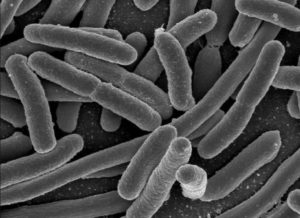Bifidobacterium infantis is a member of the bifidobacteria family, a strain of bacteria that is normally found in the human intestines. Because these bacteria do not normally cause infections, they can be used in probiotic supplements, which can aid in intestinal health and help prevent infections.
Contents
Uses
- Irritable Bowel Syndrome: Bifidobacterium infantis is sometimes used as a treatment for irritable bowel syndrome. A 2006 article in the “American Journal of Gastroenterology” reported the effects of these bacteria on the symptoms of irritable bowel syndrome. Taking these bacteria relieved gas, bowel dysfunction, problems with incomplete bowel movements and straining in patients with irritable bowel syndrome without causing any significant side effects.
- Other Uses: Bifidobacterium infantis can also be used to treat other health conditions. For example, it can be combined with another probiotic, Lactobacillus acidophilus, to prevent a condition known as necrotizing entercolitis, according to Medline Plus. It may also be useful for treating traveler’s diarrhea and ulcerative colitis and can reduce symptoms of lung infections in children. There is also some evidence that taking these bacteria after a course of antibiotics can help prevent the diarrhea that taking antibiotics commonly causes.
Benefits
- Bifidobacteria belong to a group of bacteria called lactic acid bacteria. Lactic acid bacteria are found in fermented foods like yogurt and cheese.
- Bifidobacteria are used in treatment as so-called “probiotics,” the opposite of antibiotics. They are considered “friendly” bacteria and are taken to grow and multiply in areas of the body where they normally would occur.
- The human body counts on its normal bacteria to perform several jobs, including breaking down foods, helping the body take in nutrients, and preventing the take-over of “bad” bacteria.
- Probiotics such as bifidobacteria are typically used in cases when a disease occurs or might occur due to a kill-off of normal bacteria. For example, treatment with antibiotics can destroy disease-causing bacteria, but also normal bacteria in the GI (gastrointestinal) and urinary tracts. The theory is that taking Bifidobacterium probiotics during antibiotic treatment can prevent or minimize the death of good bacteria and the take-over by bad bacteria.
Cautions
- Depending on the condition, a standard dose of probiotic Bifidobacteria is between 1 and 5 billion live organisms per day.
- Taking supplements of these bacteria can cause bloating and gas in some patients.
- Bifidobacteria and other probiotics should not be used by people with impaired immune systems, such as patients with HIV/AIDS or who are taking medications that weaken the immune system.
- Probiotics can cause dangerous infections in people with compromised immune systems, including sepsis, a potentially life-threatening condition.
Other Names
B. Bifidum, B. Breve, B. Infantis, B. lactis, B. Longum, Bifido, Bifido Bacterium Longum, Bifidobacterias, Bifidobactérie, Bifidobactéries, Bifidobacterium, Bifidobacterium adolescentis; Bifidobacterium animalis, Bifidobacterium bifidum; Bifidobacterium breve; Bifidobacterium infantis; Bifidobacterium lactis; Bifidobacterium longum, Bifidum, Bifidus, Bifidus Brevis, Bifidus Infantis, Bifidus Longum, Bifidobacteria Bifidus, Lactobacillus Bifidus, L. Bifidus, Probiotic, Probiotique.
References
Source: Cloe, Adam; What Is Bifidobacterium Infantis?, 28 Jan 2015, www.livestrong.com/article/396633-what-is-bifidobacterium-infantis/

